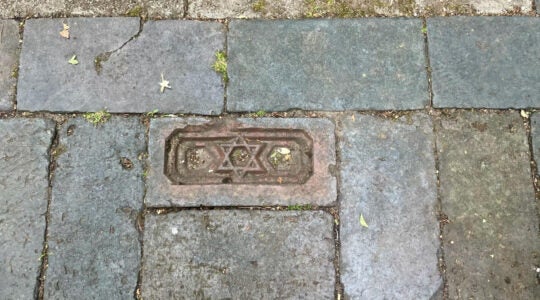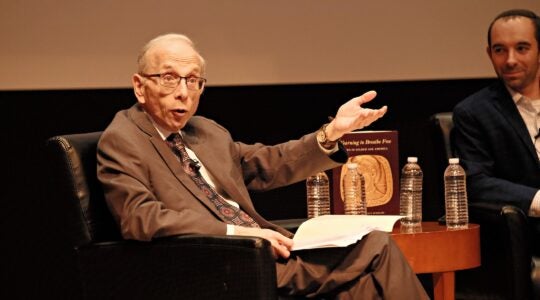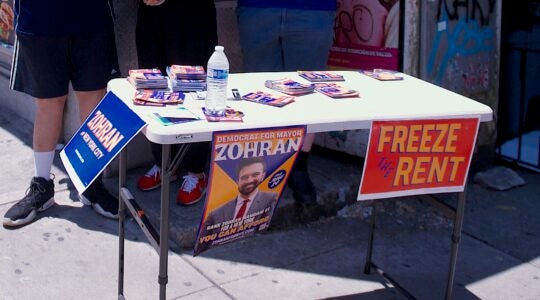WASHINGTON, Jan. 2 (JTA) — It’s axiomatic that Jews tend to view all news through the lens of “but is it good for the Jews?” It’s therefore no surprise that this filter now is being brought to bear on my former boss and mentor, Judge Samuel Alito Jr., who has been nominated to the U.S. Supreme Court. Based on my experience working closely with Judge Alito, I can answer unequivocally that yes, Judge Alito will be good for the Jews — and, by extension, for all Americans. I’m a pro-choice, registered Democrat who supports progressive candidates. I’m also a graduate of the Jewish Theological Seminary and an observant Jew who is active in my community. Notwithstanding numerous areas of commonality I have with the liberal groups opposing Judge Alito’s nomination, I wholeheartedly disagree with their position on the nomination. First, while the Jewish community may be suspicious that certain statements made when Judge Alito worked in the Reagan-era Justice Department show him to be a dyed-in-the-wool conservative intent on enacting a conservative agenda, I believe such fears are misplaced. Regardless of Judge Alito’s personal beliefs or positions that he advocated while a litigator with the Justice Department, he takes great pains to set aside his personal opinions when judging. To be frank, he did such a good job of setting aside his personal beliefs that I did not know what they were when I clerked for him. In this era in which nearly everything is subject to partisan politicization, it is hard to understand that someone can put aside one’s personal views. Yet Judge Alito is so committed to the judicial process, including the principle of respecting prior precedent, that he succeeds in doing so. Contrary to attempts to paint Judge Alito as a conservative ideologue, I can attest to the fact that Judge Alito is an open-minded judge who does not come to cases with preconceived notions. One time, while working on a criminal appeal, I made the mistake of commenting that the case should be fairly easy to decide in favor of the government, in light of the extremely slipshod brief submitted by defense counsel. Even though he was a former federal prosecutor with considerable experience with criminal cases, Judge Alito rebuked me for my attitude, and made it known that we were to carefully read all briefs and the appellate record, and conduct any additional research needed to ensure that all parties received fair hearings before the court of appeals. Like Judge Alito, we were expected to keep an open mind and not prejudge any case. Second, in areas of religious freedom, Judge Alito has a proven record of being sensitive to the needs of minority religions. It’s often said that Jews are the canaries in the mineshaft of civilization: One can tell how well a civilization is doing by the way it treats the Jews. I would extend that metaphor to all minority religious groups. Judge Alito has considerably more sensitivity to members of minority religions than some of the conservative justices currently serving on the Supreme Court. The current Supreme Court standard for determining religious discrimination cases under the First Amendment’s “Free Exercise” clause is Employment Division v. Smith, in which Justice Antonin Scalia wrote that a law that does not target religion does not violate the First Amendment. In other words, if the statute is not targeting a religious practice, it’s constitutional even if it has the effect of banning that practice. Rabbi David Saperstein of the Religious Action Center of Reform Judaism declared that the Smith line of cases would “go down in history with Dred Scott and Korematsu as among the worst mistakes this Court has ever made” — Dred Scott was the case that held that slaves were not people and Korematsu was the case that allowed the U.S. government to intern Japanese-Americans without suspicion of wrongdoing during World War II. By way of contrast, Judge Alito has written numerous opinions protecting the right of minority religious groups to be free from religious discrimination. One example of his greater sensitivity to religious discrimination cases is a case involving Muslim police officers in Newark, N.J. In that case, Judge Alito held that the city violated police officers’s Free Exercise rights by requiring them to shave their beards in violation of their Sunni Muslim religious beliefs. In another case, Judge Alito wrote an opinion stating that a university could not discriminate against a Shabbat-observant professor, since “criticism of an employee’s effort to reconcile his or her schedule with the observance of Jewish holidays delivers the message that the religious observer is not welcome at the place of employment.” In another case involving a member of a Native American religion, Judge Alito wrote that a civic ordinance may not “target religiously motivated conduct either on its face or as applied in practice.” The American Jewish community owes its vibrancy and continued viability to the constitutional protections of the First Amendment. These cases clearly demonstrate that Judge Alito is more protective of the rights of members of minority religions than some justices currently on the court. As someone who believes that the Jewish community is best served by judges who limit their roles to deciding specific cases and not enacting their personal agendas, I’m convinced that Judge Alito is by far the best person for this position. Is he good for the Jews? Absolutely.Jeffrey Wasserstein was a law clerk for Judge Alito from 1997-98. He currently is a principal in the law firm of Hyman, Phelps & McNamara, P.C., in Washington.
JTA has documented Jewish history in real-time for over a century. Keep our journalism strong by joining us in supporting independent, award-winning reporting.





